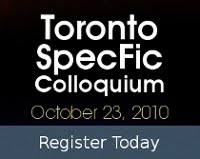“An Introduction to Urban Fantasy” is a primer for the Toronto SpecFic Colloquium, Saturday, 23 October 2010, at the Hart House and has been written in support of the Sunburst Awards. To register for the Colloquium, visit here. Spaces are limited!
I’m ambivalent about the label “urban fantasy.” It’s a term that’s been applied to a branch of fantasy for decades, but in recent years has been co-opted to describe a very specific subtype. Old-school readers take offense at paranormal authors using it. The new audience for paranormal fantasy is confused if authors don’t use it. So I’m flexible. Or indecisive.
When I sold Bitten in 1999, there was no genre label for this type of work—supernatural beings starring as the lead characters in a thriller plot. Laurell K. Hamilton
My publishers and I initially referred to my novels as supernatural thrillers. Over the next few years, as more of these series were launched, they began being to be labeled “paranormal suspense.”
Many of these early series had a strong romantic subplot that seemed to appeal to romance readers, so not surprisingly, a sister sub-genre was born: paranormal romance. What’s the difference? Plot focus. If you can remove the romance and still have a story, it’s paranormal suspense. If you can’t, it’s paranormal romance. The industry doesn’t always agree, to the chagrin of paranormal suspense authors who find their books mislabeled, and have to deal with furious romance readers.
As paranormal romance grew in popularity, there was a move to more firmly establish paranormal suspense as a separate genre. And so the term “urban fantasy” was born. Or so you’d think, to hear some folks explain it. The truth, as fantasy enthusiasts know, is that urban fantasy has been used to describe the works of authors like Emma Bull
Today, urban fantasy is an established marketing category. We used to say it required contemporary setting…until historical urban fantasy hit the scene. Some will say the “urban” part means it must be set primarily in a city, but that’s also not true—most of mine have rural or small town settings, as do many others.
So I think I have good reason for being ambivalent about the label. There’s no good definition and for every “rule” given for inclusion, I can name a handful of urban fantasy authors who break it. But as a marketing category, it seems useful enough. So when I give my talk at Hart House on October 23, I’ll call it urban fantasy, and discuss the genre in more detail.
***
Kelley Armstrong has been telling stories since before she could write. Her earliest written efforts were disastrous. If asked for a story about girls and dolls, hers would invariably feature undead girls and evil dolls, much to her teachers' dismay. All efforts to make her produce "normal" stories failed. Today, she continues to spin tales of ghosts and demons and werewolves, while safely locked away in her basement writing dungeon. She's the author of the "Women of the Otherworld










It seems to me that publishers, I'm thinking of Ace/Roc primarily, equate Urban Fantasy with Paranormal Romance.
ReplyDeleteThese labels are frustrating. I understand the need for them, I just don't see on consensus on their definitions.
For years, I fussed over whether my favourite genre was called SF, scify (or "skiffy") or speculative fiction. Ultimately, I decided it didn't matter. It only matters that the writing is good and the label helps the reader find the books in which they are interested. Ms Armstrong's books are clearly very good and, I think, the label probably helps with the marketing. This is all good.
ReplyDeleteThe first book that introduced me to urban fantasy was "Circle of light, gate of darkness" by Tanya Huff, in the 80s. I was very impressed with the characters and the Toronto setting, and the intrusion of magical things in an urban background.
ReplyDeleteLater, I read several others novels, but the label UF has branched in so many directions! Yet, never have I recaptured the feeling of this first reading. So I tend to skip many "urban fantasy" novel.